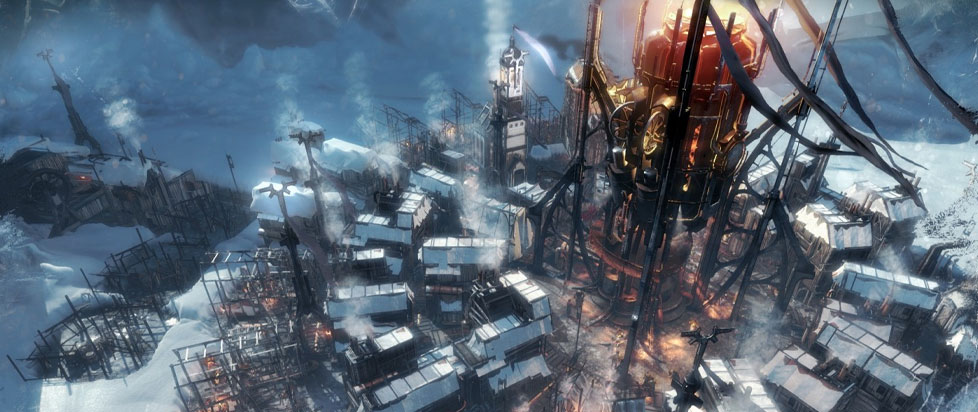
Authoritarianism (In Frostpunk) Is Not Inevitable
Post-apocalyptic city builder Frostpunk is incredibly grim. In a world thrown into a global freeze, you have to make hard decisions simply to survive. The extreme measures possible here lead many to regard it as a cynical take about the inevitability of authoritarianism – but I’d argue it’s about the inevitability of authoritarianism only when you treat people like numbers.
It can only be “about” this by forcing you to engage with it at its most “city builder.” City builders, conventionally, require you to explicitly optimize, and implicitly exploit. In other – much more cheerful, cartoonish – games, I’ve been grateful for a harsh winter for reducing population numbers that outmatched my ability to produce or store food. Happy peasants were just ones who I could wring a little more tax out of. The conventions of the genre prime you to think in a certain way while playing.
Frostpunk, even across its multiple difficulty levels, is consistently an incredibly challenging game. Early resources are finite, as are the number of citizens in your settlement. The results of mismanagement are unforgiving, and snowball. The level of challenge (rather than exploiting for tax or currency, which don’t exist in the game) push you to play optimally to survive.
Instead, it’s Frostpunk’s system of laws that leads this particular critique. There are two main decision trees – one for pragmatic adaptations to your life in the snow, and one to find new purpose. Each law transparently and objectively outlines the objective effects, on hope, discontent and any other resources, but mindless optimization isn’t without consequence.
As a cousin to the city builder technology tree, passing a law might feel like a purely mechanical act, but grumbling citizens immediately point out the drawbacks, and often the repercussions of your actions return as story events. It may be efficient to pass a law that all “gravely ill” citizens get “radical” treatment – returning the majority from hospital to work, and leaving a minority as amputees – but your game will be interrupted to ask you about one individual you’ve affected. When they’re not a statistic, and you aren’t abstractly optimising labor, what choice will you make about their life?
Every law you can pass has an immediate effect on hope and discontent – both of which can end your playthrough if they get too low or high, respectively – so there’s an inclination to keep passing them. In many cases, however, the laws you can pass only become more severe, while the effects are presented as neutrally as ever. Discontent rises when people are cold, sick and hungry, but you can mitigate that by passing a law to open a duelling house where they can redirect their frustration away from your leadership to killing each other. Or by passing a separate law to encourage the spread of propaganda. Eventually, rather than quash discontent, you can simply hire your own private police force to disperse any crowds that threaten you. In that optimization-first mindset, it’s easy to do – violence will make this problem go away. But then, so would meeting your citizens’ material needs.
To needlessly escalate, to suppress rather than address, is the path of least resistance. You don’t have to think about the citizens of your settlement as people, or consider their wellbeing in terms any greater than objective metrics of hope and discontent. You can optimise the game significantly and entirely eliminate one of these tricky resources by passing laws of increasing control – from the comfort of propaganda to the threat of public executions – until you are an autocrat, and “hope will never be a problem again”.
Frostpunk is, however, incredibly critical of playing the game this way. Should you win this way, you’re treated to a biting recap of your decisions, without any of the neutrality that was present when you first made them. “The city survived,” it concludes, “but was it worth it?”
Frostpunk relies on player familiarity with the genre – the desire to get to the end of a technology tree, to not “waste” turns where you could be passing laws – to enact its critique. But despite the high pressure, it’s entirely possible to win the game without exhausting its mechanics or making callous decisions. Authoritarianism in Frostpunk is not inevitable.
With its setting of climate disaster and the fractured British Empire, Frostpunk recognizes that ruthless dehumanisation might become a useful political tool to leadership in times of upheaval – for those who would ask “who do we not save” – but attributes harm to a convenient choice to dehumanise, and not as a natural consequence of disaster.
Ruth Cassidy is a writer and self-described velcro cyborg whose DMs are open for pictures of mountains & your cats. Direct them to twitter @velcrocyborg.





